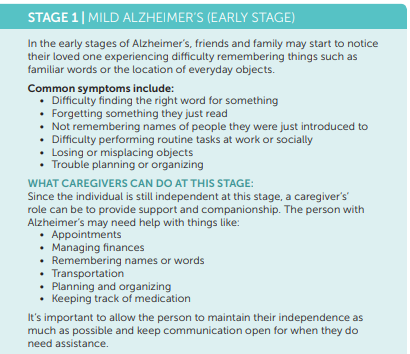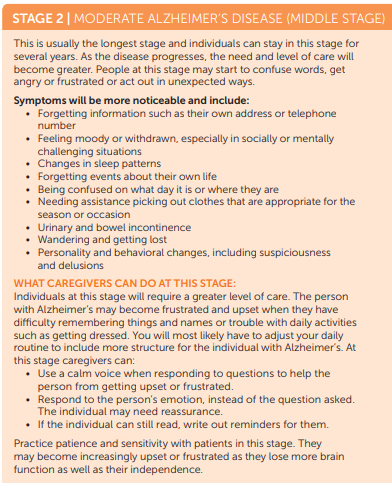National Alzheimer’s Disease Awareness Month: What Caregivers Should Know
Understand the three stages of Alzheimer’s disease and how caregivers can help patients in each of these different stages
Alzheimer’s or Dementia?
Alzheimer’s and dementia are often confused and used interchangeably, but they are different.
Dementia is an umbrella term that refers to a list of different symptoms, one of those being brain and memory function. There are diseases other than Alzheimer’s which can cause dementia. When an individual is diagnosed with dementia, they are being diagnosed with a set of symptoms, without knowing what is specifically causing them. Some forms of dementia are temporary or reversible.
Alzheimer’s disease is a form of dementia that specifically affects parts of the brain that control thought, memory and language. Symptoms of the disease include impaired thought, speech and confusion. Alzheimer’s is not reversible or curable.
The 3 Stages of Alsheimer’s
10 signs of Alzheimer’s
Here are 10 warning signs and symptoms of a person having Alzheimer’s disease:
1. Memory loss that disrupts daily life This is the most common sign. Forgetting information that was recently learned, forgetting important dates or events, asking the same information over and over and relying heavily on memory aids or other people for reminders are all signs of Alzheimer’s.
2. Challenges in planning or solving problems. Individuals with Alzheimer’s may have difficulty following a plan or working with numbers. They may be unable to follow a familiar recipe, keep track of monthly bills, or have difficulty concentrating and carrying out simple tasks that didn’t present a problem before.
3. Difficulty completing familiar tasks. People with Alzheimer’s may find it hard to complete tasks such as driving to a familiar location, managing a budget, or remembering the rules to a favorite game.
4. Confusing time or place. Losing track of dates, seasons and time is a common sign of Alzheimer’s. People with the disease may forget where they are or not know which day of the week it is. They could also have trouble understanding something if it is not happening immediately.
5. Difficulty understanding visual images and spatial relationships. Experiencing vision problems can be a sign of Alzheimer’s. Some people may have trouble reading, judging distance and determining colors.
6. Trouble with finding the right words. People with Alzheimer’s may have trouble finding the right words. They may call items or people by the wrong name. They might stop in the middle of a sentence and not know how to continue.
7. Misplacing things and losing the ability to retrace their steps. Individuals with Alzheimer’s may lose items and be unable to retrace their steps to find them. They might put things in odd places. They may even accuse others of stealing.
8. Decreased or poor judgement. Alzheimer’s can affect the decision-making process. Therefore, people with the disease may use poor judgement such as giving money away to telemarketers or solicitors.
9. Withdrawal from activities. A person with Alzheimer’s might start to avoid being social and may even withdraw from hobbies, social activities, or work projects. They may have trouble remembering how to complete a favorite hobby or keep up with a favorite sports team.
10. Changes in mood or personality. Someone with the disease can become confused, anxious, fearful or depressed. They can get easily upset



